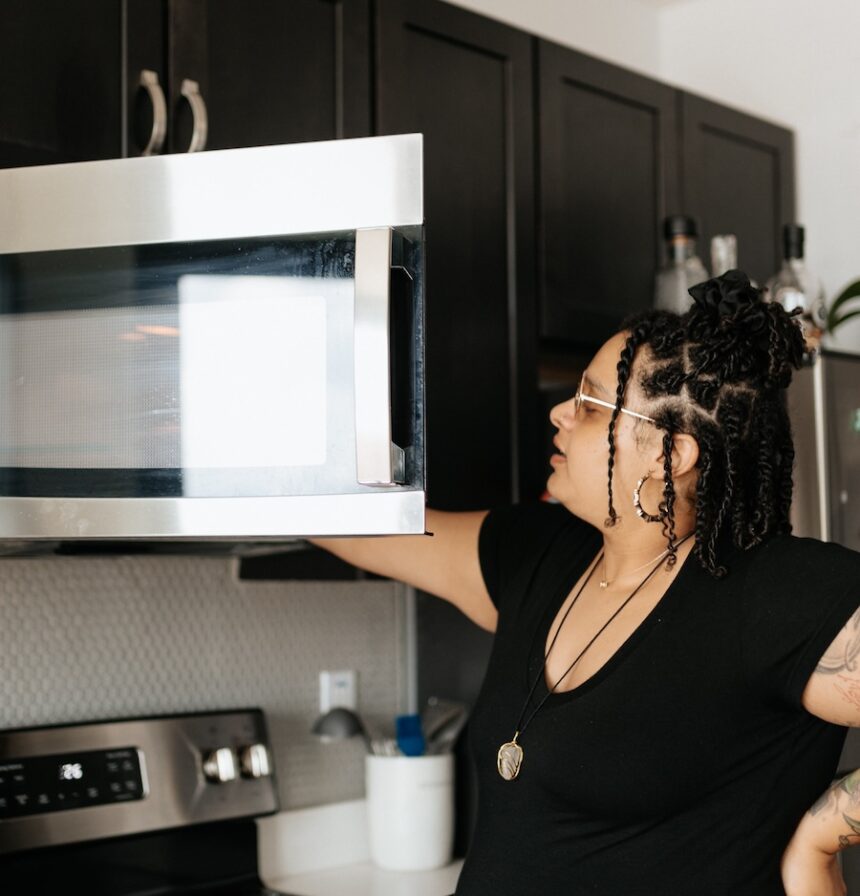Microwaves are a very polarizing kitchen item. Most American kitchens have them, but there’s also a strong opposition to these convenient cooking appliances. Why is that?
Some people claim that microwaved foods can cause cancer. Or, that the radiation within microwaves will destroy the precious nutrients of the fruits, vegetables, and meats you cook in them. But are microwaves bad for you and your health, in reality?
How a Microwave Cooks Your Food
Instead of flame or oven heat, the food in your microwave is cooked by energetic waves – electromagnetic radiation, to be exact. They’re like radio waves, but just not as long. These waves vibrate at a rate of about 2,500 megahertz per minute.
If you’re not sure what that means in layman’s terms, it’s basically the vibrational rate of your cell phone. These waves target water and electrically asymmetrical molecules. What does that mean?
That means that one end of the molecule is positively charged, and the other end is – you guessed it! – negatively charged. The microwaves make these asymmetrical molecules vibrate at a very fast rate, and all that movement creates heat. This heat cooks your dinner quickly.
That’s a very brief explanation of how microwaving food works. As you can see, it’s basically a way to cook food using radio-like waves.
Microwaves and the Radiation Scare
Ionizing radiation can be harmful, and people mistakenly think that the radiation within a microwave is the same as this harmful type of radiation. You know the type – the ionizing radiation that you’re exposed to in the form of X-rays and the ultraviolet light of the sunshine. This kind of radiation can actually make ions separate from their molecule.
When it comes to microwaves, the truth is that these waves can’t make molecules break apart.
Instead, it’s a form of radiation that only makes the molecule vibrate. So, if you’re scared of the radiation happening inside your microwave, try to remember that it’s safe. It’s the same form of radiation that sound waves and visible light are made of.
Does Microwaving Kill Nutrients?
People fear that radiation – whether ionizing or not – can destroy the nutrients within the fruits, vegetables, and meats you cook inside the microwave oven.
But here are some sound reasons why your microwaved dinner isn’t altered, dangerous, or even cancer-inducing.
Microwave Radiation Isn’t a Health Threat
Now we know that microwaves do use a form of radiation. However, according to The American Cancer Society, it isn’t a health threat for the following reasons.
First of all, the radiation is safely contained within the microwave oven. Second of all, although this radiofrequency radiation can vibrate molecules and create heat, it cannot change the chemical or molecular structure of the food.
Some people believe that microwaves create radioactive food, but since these microwaves aren’t radioactive in the first place, your food can’t possibly become radioactive either!
Cooking Always Takes Away Nutrients
Many people boycott microwaves because they believe that these appliances, more than any other cooking method, destroy nutrients.
It doesn’t matter if you consider stove-top cooking, your oven, fried foods, or barbecuing – microwaving is the worst way to cook foods, according to the anti-microwave party.
However, Catherine Adams Hutt, RD, Ph.D., a registered dietician and certified food scientist, says that “whenever you cook food, you’ll have some loss of nutrients.”
The best cooking method for retaining nutrients is one that cooks quickly, exposes food to heat for the smallest amount of time, and uses only a minimal amount of liquid.
So, you may be a staunch opponent to microwaves, but you may very well be blasting away beneficial properties from your food, even without a microwave. That’s because there are several different factors that determine how much of the original nutritional value remains in the food once it’s cooked.
You need to consider how long you cook your food, the amount of liquid you use, and the temperature at which you cook it.
So, when you boil, over-bake, or fry your foods on a daily basis, you could easily be cooking away necessary nutrients with or without the dreaded microwave.
Microwaves May Be Better at Preserving Water Soluble Vitamins
Irrespective of where you cook your vegetables, one thing is for certain: nutrients just break down when you expose them to heat. Plain and simple.
And instead of being the worst destroyer of some nutrients, the microwave can actually preserve more of them than stovetop cooking does.
According to Harvard University, water-soluble vitamins like vitamin C and B vitamins are more sensitive to heat than other nutrients. What’s more, these are the nutrients that you’ll find in most vegetables.
Luckily, when you cook veggies in the microwave, you don’t lose as many of their water-soluble vitamins. That’s because you cook them for a much shorter time in the microwave than on the stove or in the oven.
Cornell University found the same thing was true of cooking spinach in the microwave. Spinach is full of folate, and when it was cooked on the stove, about 77 percent of its folate was lost. Instead, cooking it in the microwave preserved almost all of the spinach’s folate!
Cornell scientists also found that by cooking bacon in the microwave rather than on the stove, you can decrease the number of nitrosamines, a carcinogenic chemical compound, you consume.
Is Microwaving Chicken Safe?
Microwaves may not be harmful or kill nutrients, but when it comes to microwaving raw meat, things are a bit more complicated.
Generally, it’s not advised to microwave raw chicken (or any other raw meat) since microwaves may not kill harmful bacteria. While the USDA confirms it’s safe to cook meat in a microwave, the main problem lies in the way microwaving food works. Unfortunately, it can cook unevenly, and there may be some cold spots left, which means that not all of the harmful bacteria are killed off.
When cooking raw chicken, it’s important to make sure the meat is cooked through and has reached a safe internal temperature. To avoid any negative side effects, however, it may be better to steer clear of cooking frozen chicken in a microwave and choose alternative cooking methods instead.
How Much Water Are You Using in the Microwave?
When it comes to cooking vegetables in the microwave, if you want to get the most nutritional bang for your buck, remember to pay attention to how much water you cook them in.
If you cook your vegetables in too much water in the microwave, many of the nutrients will drain into the water. And who drinks their vegetable water?
A 2003 study in The Journal of Science of Food and Agriculture found that broccoli lost nearly all of its antioxidants when it was immersed in too much water in the microwave.
How you cook your food is a deeply personal choice. If you’ve boycotted microwaves or are simply afraid of all the potential health “threats”, reconsider using this kitchen appliance.
When used appropriately, you can make convenient, safe, and nutritionally abundant meals for you and your family.








